For decades, Hollywood has gleefully harnessed science fiction for big, dumb, outrageously fun sequences like the Hulk socking a colossal alien leviathan in the jaw in 2012’s The Avengers; Arnold Schwarzenegger rebuffing a three-breasted mutant in a scuzzy Martian brothel in 1990’s Total Recall; and Charlton Heston cursing out a “damn dirty ape” in 1968’s Planet of the Apes.
Lately, however, popular sci-fi has been associated with a far different sort of scene: Sandra Bullock's tear-streaked howling as she floats alone in orbit in 2013’s Gravity; Matthew McConaughey’s devastated sobbing as he watches from deep space while his young daughter ages into Jessica Chastain in 2014’s Interstellar; and Matt Damon's face shaking with profound relief, fear, and gratitude as he blasts off from the surface of Mars in 2015’s The Martian.
Science fiction is by far the most popular genre in filmmaking — of the top 500 highest grossing films of all time domestically, 25% have been sci-fi. And yet, of the more than 500 movies nominated for the Academy Award for Best Picture, just 10 — not even 2% — have been sci-fi. Until quite recently, sci-fi's track record at the Oscars was even worse: Only three sci-fi films — 1971's A Clockwork Orange, 1977's Star Wars, and 1982's E.T. the Extra-Terrestrial — had earned Best Picture nominations before 2009.
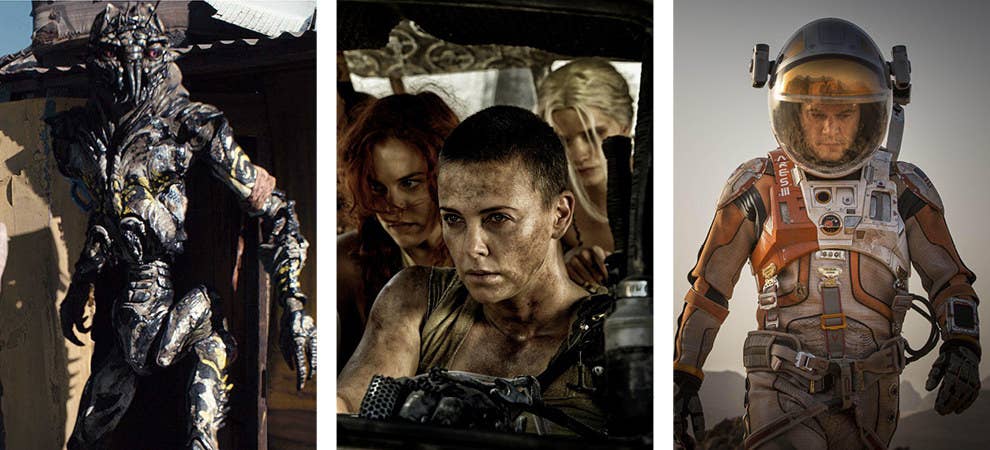
That year, however, sci-fi's Oscar fortunes began experiencing a sudden, radical turnaround. A potent series of acclaimed science fiction films have earned nominations for Best Picture, and often for their directing, acting, and screenplays as well: Avatar and District 9 in 2009, Inception in 2010, Gravity and Her in 2013, and Mad Max: Fury Road and The Martian in 2015. With the exception of Her, these were not modest indie productions made for niche audiences, either; these movies earned on average roughly $260 million domestically, and $800 million worldwide.
Some of this awards success might be chalked up to the Academy's expansion of the Best Picture category from five films to as many as 10, but the movies still have to exist and be good enough to rate a Best Picture nod in the first place. Of course, the Oscars aren't the only arbiter of cinematic quality. Interstellar, along with sci-fi movies like 2015's Ex Machina and 2012's Looper, have also earned wide praise and good-to-great box office returns — if not major Oscar plaudits. Taken together, however, the sudden and potent spike in critical acclaim, financial success, and awards season prestige marks a profound shift in how Hollywood regards what is even possible with science fiction. Instead of using the genre for movies engineered to exist within an expansive ecosystem of sequels, prequels, and reboots — not to mention merchandising tie-ins and theme park rides — these new sci-fi movies are bespoke works of art. Even the ones featuring visually dazzling action set-pieces are also suffused with a humane emotionality far beyond standard popcorn fare.
As Hollywood trends go, this new swell of prestige sci-fi films untethered to larger franchises remains modest when measured against the tsunami of sci-fi inflected superhero movies flooding theaters seemingly every weekend. But it is growing. Arrival, about humanity’s first contact with aliens and starring Amy Adams, opens on Friday. Passengers, an interstellar romance starring Jennifer Lawrence and Chris Pratt, and The Space Between Us, a youth-driven adventure with Asa Butterfield and Britt Robertson, open in December. Next year promises at least a half dozen more non-franchise sci-fi projects, from big studio productions like Life, starring Jake Gyllenhaal as an astronaut, to outlandish independent films like whatever Gyllenhaal is doing in Okja. At a time when Hollywood seems allergic to new ideas, even as a teeming slate of franchise movies have struggled mightily to connect with audiences, these artistically ambitious sci-fi productions provide a gratifying promise of an exciting filmmaking future. Yes, the most ubiquitous genre in Hollywood could save the movie business from itself.
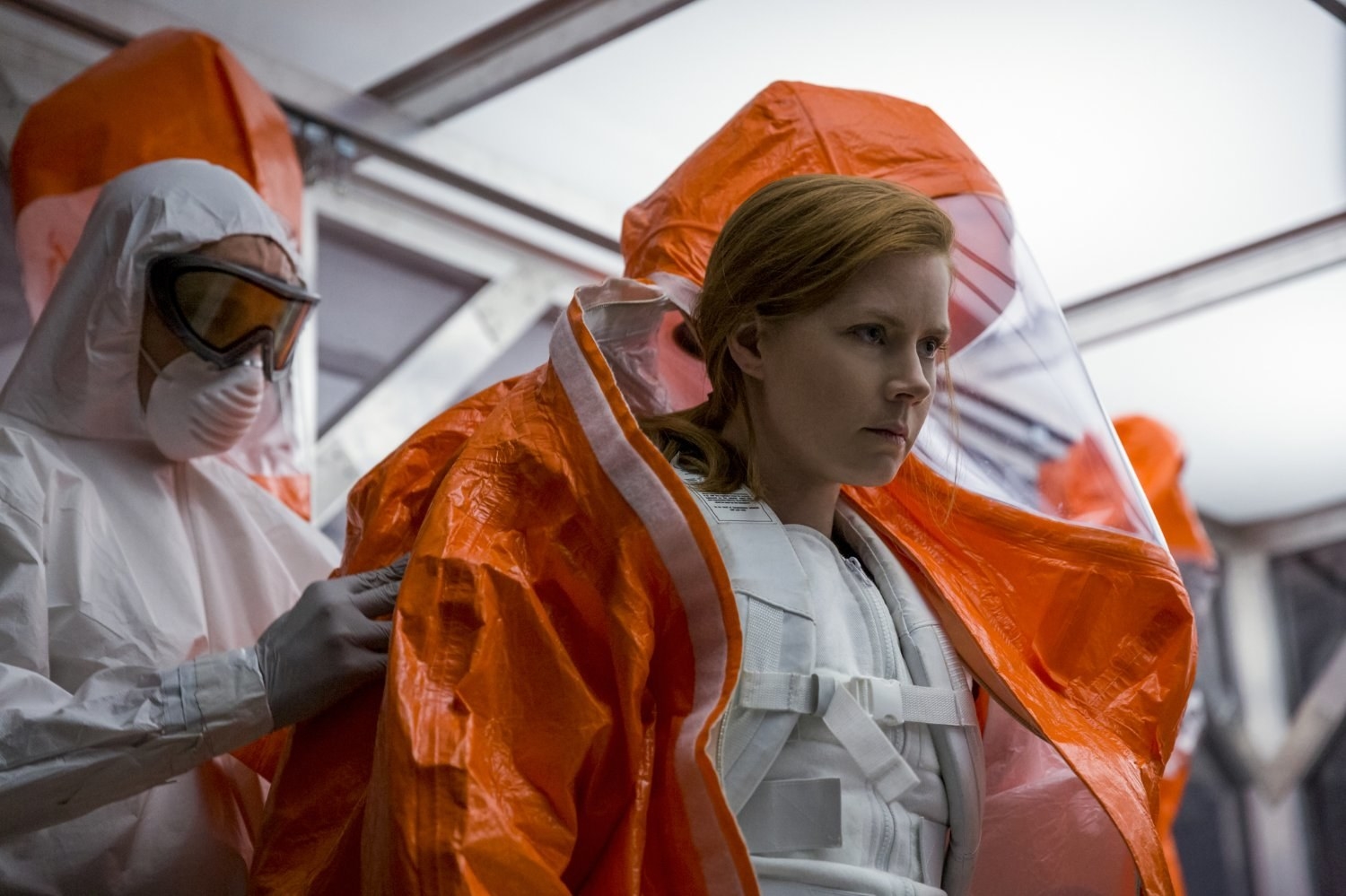
Defining what even constitutes “science fiction” is not an altogether easy task. At their most basic level, sci-fi movies present a world somehow different from our own. They're stories based on a "what if?" conceit rooted in our understanding of (and anxieties about) science and technology. In Arrival, that question is both high-concept and straightforward: What if aliens landed on Earth and we actually had to figure out how to communicate with them? For Passengers, it's more emotional and complicated: What if two people in hibernation on a massive spaceship on a 120-year journey to a new planet woke up with 90 years still to go?
But with such a broad definition, the boundaries of what could be called "sci-fi" have become vexingly elastic. Superhero movies as disparate as Deadpool and Thor could be called science fiction, as could the gadget-driven Mission: Impossible movies, the apocalyptic hellscapes of Mad Max: Fury Road, and the soggy comedy of Hot Tub Time Machine. In practice, sci-fi most often conjures images of warring spaceships, exotic aliens, and talking robots, excellent fodder for assembling potential blockbusters. And yet there are sci-fi purists who feel quite passionately that the most successful manifestation of those tropes — the Star Wars franchise — is a fantasy saga gussied up in sci-fi drag. Indeed, the divide between sci-fi and fantasy is so blurry that the two are often thrust together with just a slender slash separating them.
The paradox that has haunted science fiction cinema since its inception is that its fuzzy, far-reaching borders have predominantly contained the genre in a shallow, if comfortable, creative ghetto. "Sci-fi [movies], let's face it, are B movies," Arrival director Denis Villeneuve told BuzzFeed News in a phone interview. "To create strong movies out of that genre, it's very difficult." Making sci-fi films had been a lifelong dream for the French-Canadian filmmaker; when Hollywood came calling after his 2010 breakout Middle Eastern war drama Incendies, he desperately wanted to use the vast resources of a studio to break into science fiction. But finding a project that also matched his creative ambitions proved challenging in the extreme. "A lot of stories are about war and technology, and not necessarily an exploration of the human condition," he said. "Very often, it's a genre that's fallen to clichés. It's very difficult to find something [where] there's a potential to create something new."
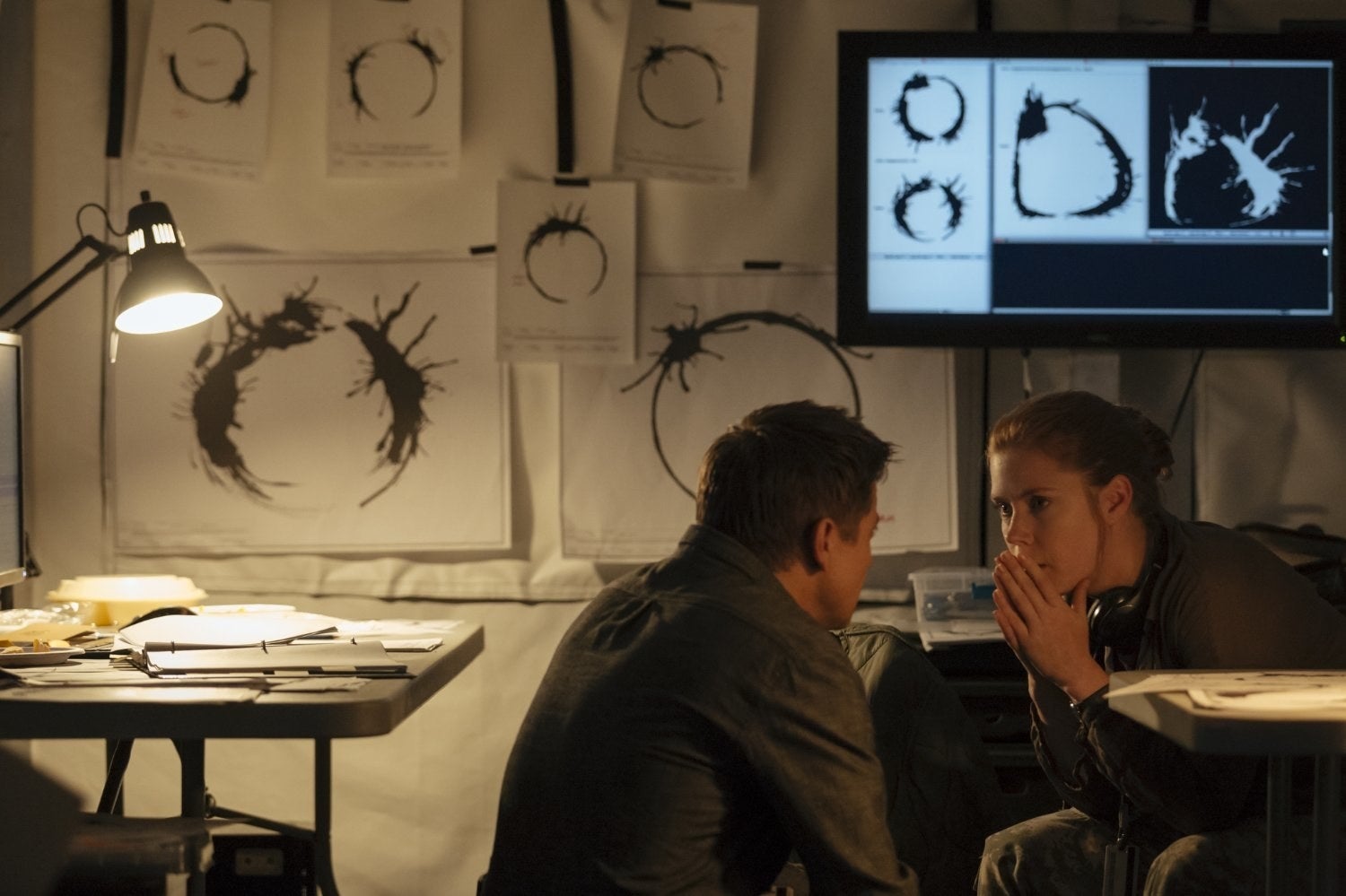
There's a brutal math to sci-fi films at Hollywood studios that has kept the genre from exactly that kind of creative risk-taking: The larger-than-life scope inherent in most science fiction storylines drives up the production budget, which has executives nervously pushing the films to bring in as broad an audience as possible. "Generally speaking, what is normally considered down-the-middle bullseye science fiction has tended to be about as male-skewed as any genre out there," said Adam Fogelson, chairman at STX Entertainment's movie group, the upstart studio releasing The Space Between Us. And without the wider built-in audience that comes with a major franchise — like Jurassic Park, Transformers, or The Hunger Games — studios have not had much appetite for original sci-fi scripts that had little-to-no sequel potential.
"I'd not had a good track record getting science fiction scripts made," said Arrival's screenwriter, Eric Heisserer. "Almost all of them were either original science fiction, or they were based on source material that didn't have a big brand name behind it. And therefore we fell in that same trap of the studio, at the end of the day, didn't know how to market it, and was looking at an expensive price tag of anywhere between $50 and $120 million."
"Some of the notes that we got were, 'You need to have someone punch an alien at the end.'"
Arrival was, at first, no different. It's based on "Story of Your Life," an emotionally and narratively complex sci-fi short story by Ted Chiang. Heisserer had fallen hard for it in the mid-2000s, and he sought out producing partners Dan Cohen (Stranger Things) and Dan Levine (Along Came Polly) to help him try to make it. "We went around to all of the studios," said Heisserer. "It was the same comment every time, which was, 'This is execution dependent.'"
Translation: Franchise movies supposedly don't have to be good to earn a strong opening weekend, but this kind of movie does. A few studio execs even tried to refashion Chiang's story into a more standard Hollywood product. "Some of the notes that we got way early were, 'We're not going to buy the film unless you change the lead to a man,'" Heisserer said with a mordant chuckle. "Or, 'You need to get rid of all the flashbacks.' Or, 'You need to have someone punch an alien at the end of it.'"
Passengers faced a similarly steep uphill battle. After appearing on the 2007 Black List — a list of the best unproduced screenplays in Hollywood, as determined by a survey of movie industry professionals — Jon Spaihts' original script spent years with various filmmakers and stars attached, including Keanu Reeves and Rachel McAdams at one point. But no one could actually get it made.
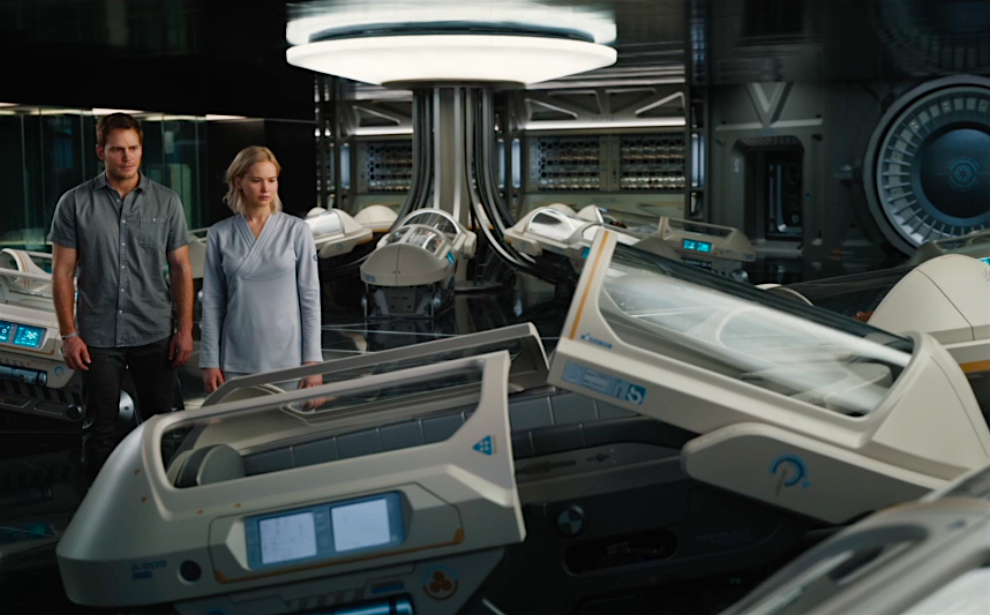
"It's set on a luxury starship — there's no cheap way to do that," Spaihts explained to BuzzFeed News on the set of Passengers in Nov. 2015, as the crew worked on an extravagant two-floor bedroom suite just behind him. "And then on top of that, you're asking them to bet their money on a kind of story that nobody's seen before." Despite the movie's grim premise — two people are forced to spend the rest of their lives alone on a giant starship — Spaihts also deliberately tried to avoid the dystopian bleakness that had saturated so much science fiction. "To me, it's funny, it's got action, it's got thrills, it's sexy, it's got a big love story," he said, ticking each element off with his fingers. "But if you're a very cautious studio executive, you can look at it and see nothing. You don't see a big villain conspiracy. It's not exactly a shoot-em-up. It's not just a romantic drama. It's hard to put in a box. So it can be difficult to figure out how to approach it."
Complicating matters further, both projects hit Hollywood just as the industry was beginning to shift into a franchise economy, leaving even fewer resources for original productions. But both Heisserer and Spaihts persisted long enough for the tide to turn in their favor. After Heisserer adapted "Story of Your Life" on spec, it promptly landed on the Black List in 2012, where it caught Villeneuve's attention. It was, the filmmaker said, "original material that wasn't a comic-book story, that wasn't full of special effects, that's not about war." Once Villeneuve agreed to direct, and Adams signed on to star, five studios reportedly pursued domestic distribution rights for the project at the 2014 Cannes Film Festival, before Paramount picked it up for $20 million. (The actual production budget for the movie — just under $50 million — came from independent production companies FilmNation and Lava Bear Films.)
Meanwhile, after spending the better part of a decade bouncing around Hollywood, Passengers ultimately landed at Sony Pictures in Dec. 2014. The next month, Morten Tyldum, fresh from his Best Director nomination for The Imitation Game, agreed to direct. And by February, Lawrence and Pratt were in negotiations to star. "It's kind of funny for me to hear that it's been a movie that's been around for a lot time," said Tyldum with a laugh. "Because from when I read it to when it was a 'go' movie with two of the biggest stars of the world, it actually took no time."
Seemingly overnight, these projects went from also-rans to the hottest prospects in town, caught up in a sudden, sweeping transformation in how original science fiction is perceived in Hollywood.
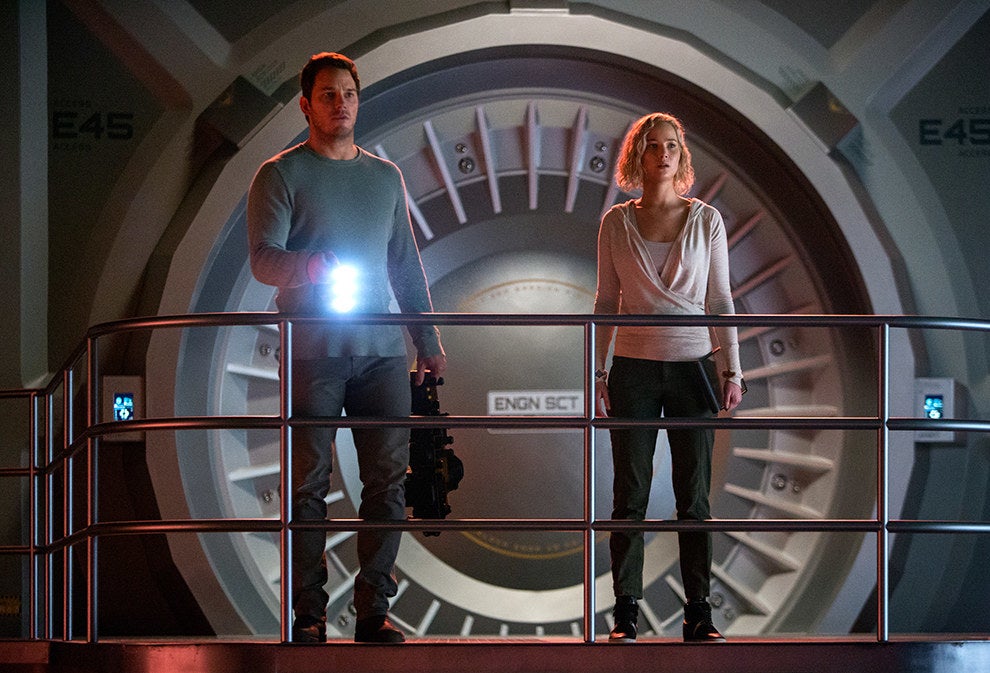
Obviously, the blockbuster success of Gravity in 2013 (with $723.2 million worldwide) and Interstellar in 2014 (with $675.1 million worldwide) helped enormously with the notion of how much original science fiction could earn. Now, "other filmmakers can say, 'That's what I want to make,'" said Heisserer. "It's really opened the door for us."
The genre also serves Hollywood's addiction to visual effects–driven spectacle, which translates well with global audiences, an increasingly vital target for any major studio production today given the increasing competition from TV. "This is one of the last provinces where film and film alone can deliver this story," said Spaihts.
That is particularly important for studio marketing departments, which burn through budgets that can reach beyond $50 million to compete with the ever-growing array of options for personal entertainment. "Science fiction typically has a built-in epic scope and significant special effects that [make for] good trailer moments," said Franklin Leonard, a longtime film executive and the founder of the Black List. "They suggest a world that is bigger than a small character drama."
But these prestige sci-fi movies aren't winning over critics and earning Oscar gold because of killer trailers. "There's some belief that, like, you know, Star Trek is entertainment, not art," said Leonard. "When you synthesize Star Trek with an exceptionally written screenplay and you frame it for an audience and for critics as something that is awardsworthy, people are more willing to embrace it as being art and not just commerce."
Star Trek is indeed a perfect example of both a platonic ideal of science fiction — an unapologetically brainy investigation into humanity's exploration of space — and how Hollywood has commandeered sci-fi by injecting it with eye-popping visual effects, hyperkinetic editing, and a blithe disregard for its nerdiest tendencies. But movies like Gravity, Interstellar, and The Martian have figured out how to deliver the optical thrills studio business models demand while remaining true to the hallmarks of what makes science fiction such a unique vehicle for meaningful storytelling.
"Every one of us is aware of technology, science, and progress in a way that we never were before."
"You can explore ideas," said screenwriter Nicole Perlman (Guardians of the Galaxy, Captain Marvel). "Sociological ideas, or philosophical, or sometimes even interpersonal ideas. And if it wasn't happening between a human and a robot, or an alien and a human, or an alien and a robot — like, if it wasn't happening in this genre, people might not be open to either buying a ticket to see it, or even letting that idea emotionally affect them."
It certainly helps that just about every moviegoing demographic on the planet is now confronting the same issues sci-fi has explored for a century in their daily lives. "Every one of us is aware of technology, science, and progress in a way that we never were before," said Fogelson. "Think about who was spending all day with technology 15 years ago, and think about the fact that everyone is spending all day with technology today. It's a different world." The kinds of stories that used to feel like escapism (e.g. The Matrix) can feel downright quotidian today (e.g. just about half the episodes of Black Mirror), while the kind of grand cinematic spectacle that used to feel exceptional can now be achieved with ubiquitous (and often cheap) CGI.
So now that audiences have started living in the brave new world they've been seeing in sci-fi movies for decades, filmmakers have had to pull the genre back into the realm of the possible, rather than the extraordinary. That’s translated into bringing a greater sense of scientific authenticity to the stories they're telling. Gravity is so based in space exploration as it exists today that director Alfonso Cuarón has said he really doesn't consider it to be science fiction (even if Neil deGrasse Tyson, as well as other scientists and astronauts, would beg to differ). The filmmakers behind The Space Between Us, meanwhile, did extensive research into their film’s more speculative central premise: What would happen to a child’s physiology if he was born in space?
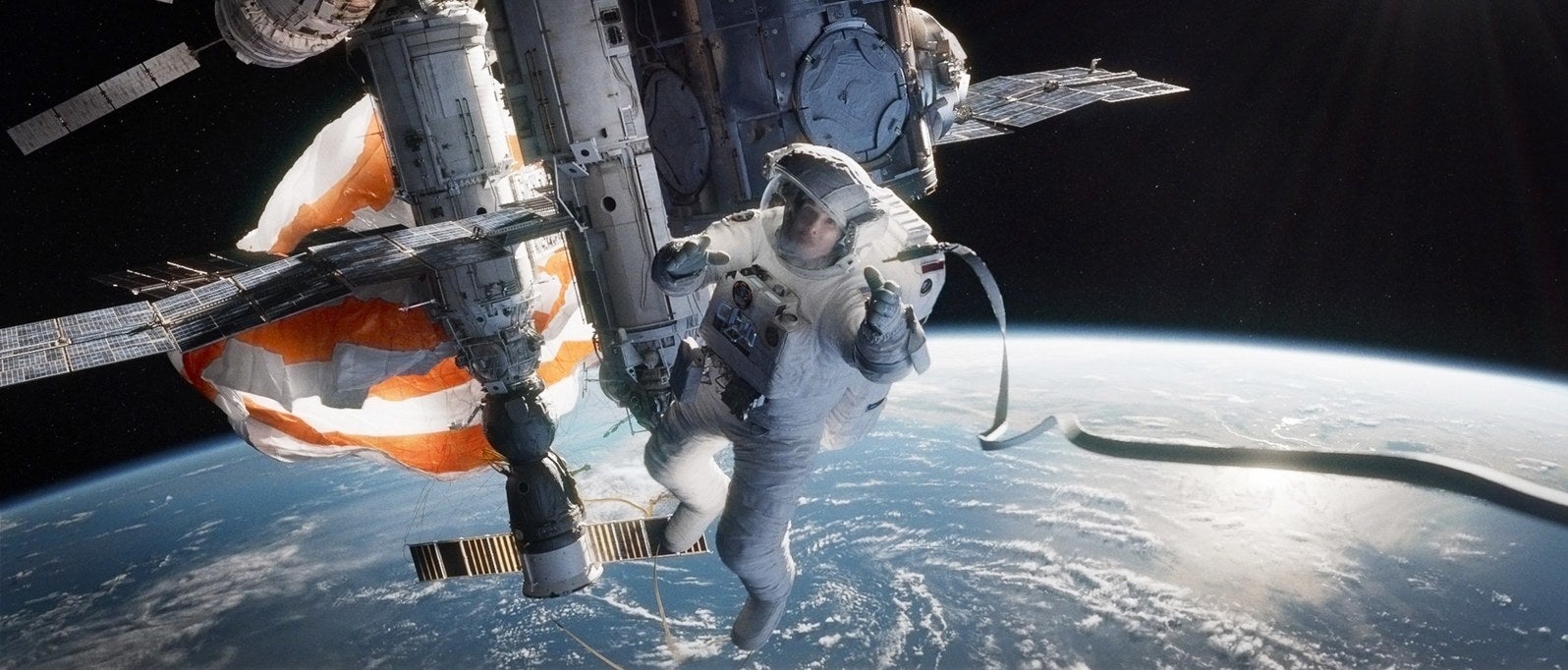
That same fidelity to practical science can be seen next May in Life, an original sci-fi adventure starring Gyllenhaal, Ryan Reynolds, and Rebecca Ferguson about a team of astronauts who discover life on Mars. "Life should feel like it could happen today," said producer David Ellison (Mission: Impossible – Rogue Nation, Terminator Genisys). "We wanted there to be a level of reality to where you felt you could pick up the newspaper and read about this actually happening," Ellison continued, noting Life is set on the International Space Station "as it exists right now."
"Part of the appeal of those films is they are going to be an incredibly realistic, well-researched science fiction film," said Perlman. "There's something mind-blowing about watching a movie and thinking, Well, this conceivably could happen."
Even though Passengers is set several centuries in the future, Tyldum still devoted a great deal of the production to rooting the film within the physical laws of nature. "Gravity is created by everything in the ship rotating at 51 meters per second," said the director. "Food is designed by how a machine would prepare food. We tried to be smart about it and still be imaginative and fun." For the spaceship central to the film, production designer Guy Hendrix Dyas (Inception, Superman Returns) even created a detailed backstory, positing that because it would have taken 80 or 90 years to build, the architecture would have shifted over time from the familiar and utilitarian central command area to the ethereal outer sections that house the various habitats.
"All [sci-fi movie] designers are trying to get in the pantheon of the top 10 spaceships ever designed," Dyas said with a laugh in his production office, his walls overrun with detailed blueprints for every element of the ship. But Passengers wasn't just a chance to make movie history for Dyas, who had first-hand experience of how sci-fi cinema can affect our daily lives. "I used to be product designer for Sony, and I know for a fact that in the real world, they draw a lot of inspiration from science fiction films," he said. "We used to sit there at Sony in Japan, wondering how we could create this camera that we saw in Blade Runner. There really is a responsibility."
By contrast, costume designer Jany Temime (Gravity, Children of Men) wanted to keep Passengers' garments rooted as much in the here and now as possible. "I told Morton straightaway, if he would have said to me, 'I want them all dressed up in a little green suit with little ears,' I would have said, 'I'm not doing it,'" she said, sitting at her desk, surrounded by racks of clean, understated apparel in pleasant, muted hues. Her attraction to the recent surge in prestige science fiction — or, as the French-born Temime says it, "seeance-fi" — has never been about far-fetched gadgetry or otherworldly design. "What I find so extremely interesting in all those films is that they don't touch the science-fi for the kick of it," she said. "They touch the science-fi for all the psychological and philosophical problems which develop with the progress of science. It's the same in Interstellar, it's the same in Gravity. It's about people. It will always be about people. Because human nature won't change, and that's what I find so interesting. And that's also the reason why I didn't want to dress them in a green suit with little ears."
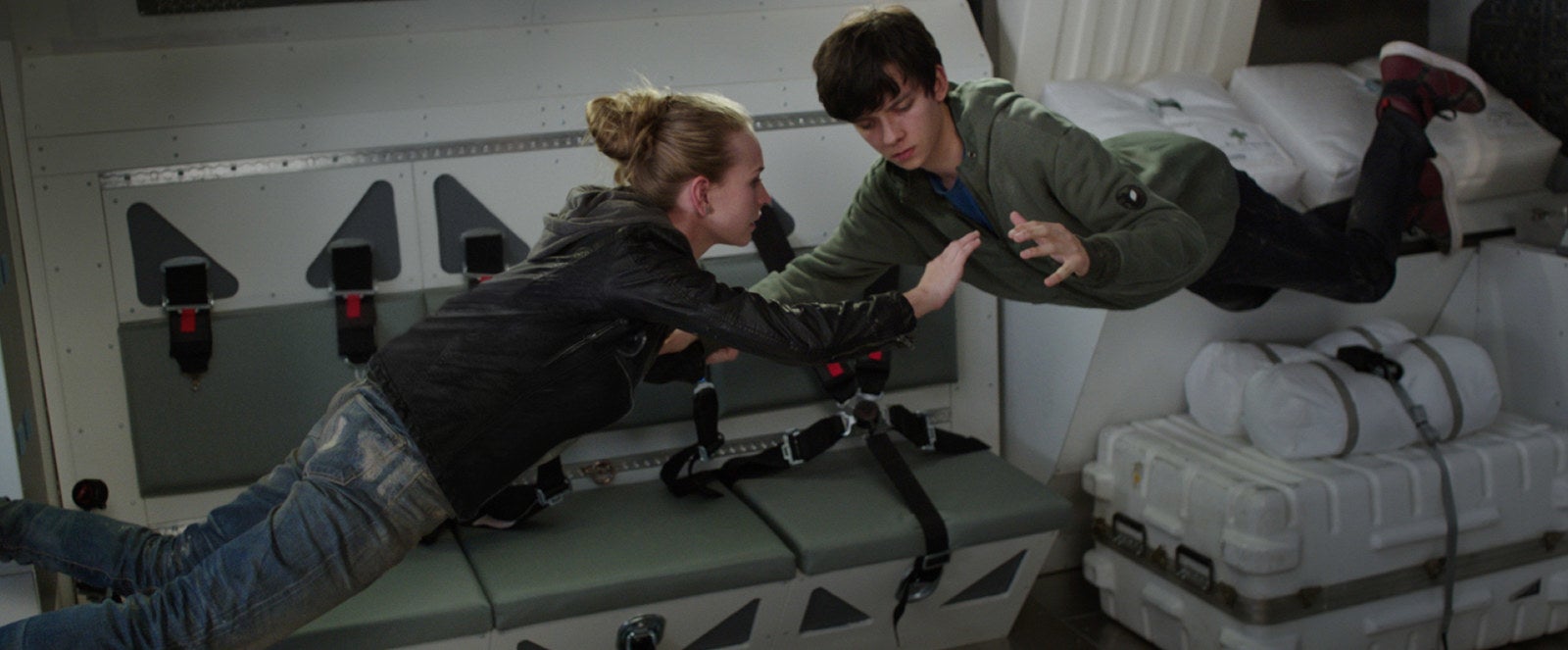
That human connection has been in terribly short supply in Hollywood's glut of sequels, prequels, and superhero franchise movies of late — and this year, moviegoers have rejected them in droves. "I think audiences have looked at superhero movies, and specifically looked at the ones that have not lived up to the hope or the expectation that they held due to their giant titles, and they've been disappointed," said Dana Goldberg, another producer of Life, and the chief creative officer at Ellison's Skydance Productions. "I think that's partially why people are finding themselves more drawn to original fare."
The care prestige sci-fi projects take with the emotional inner lives of their characters, meanwhile, has proven irresistible to top-tier talent. "It's such a character driven film," Tyldum said of Passengers. "It's the humanity of the story that actually appeals to me more than the sci-fi."
His star wholeheartedly agreed. "I wouldn't just sign up for a movie just because it was in space," Pratt told BuzzFeed News between takes on the Passengers set. "In fact, I was offered a bunch of movies that were in space after Guardians of the Galaxy, and I turned them down. This one I did because I knew it would work, whether it was in space, or on a cruise ship, or in a Volkswagen, you know?"
In turn, the commitment from A-list stars and acclaimed filmmakers to making these films, matched with their trailer-friendly visual scope, becomes an offer studios cannot refuse. "They can't market a brand with a movie like Interstellar or Gravity, but they can market the filmmakers, and the cast," said Heisserer. "They can market that experience."
This confluence of circumstances set the stage for Villeneuve’s next movie: Blade Runner 2049, the sequel to Ridley Scott’s seminal sci-fi film about the hunt for a race of renegade “replicants” in a striking vision of a dystopian Los Angeles. When it opened in 1982, the original film was neither a box office hit nor an Oscar darling (it earned just two nominations, for art direction and visual effects, and won neither). But Blade Runner’s influence — in filmmaking, and in the culture at large — can scarcely be understated. Still, it took 34 years for a sequel to materialize, with Scott producing and Harrison Ford reprising his role as Rick Deckard — it's the quintessential synthesis of Hollywood’s hunger for franchise-friendly visual splendor with the industry’s newfound appreciation for emotional truth in science fiction.
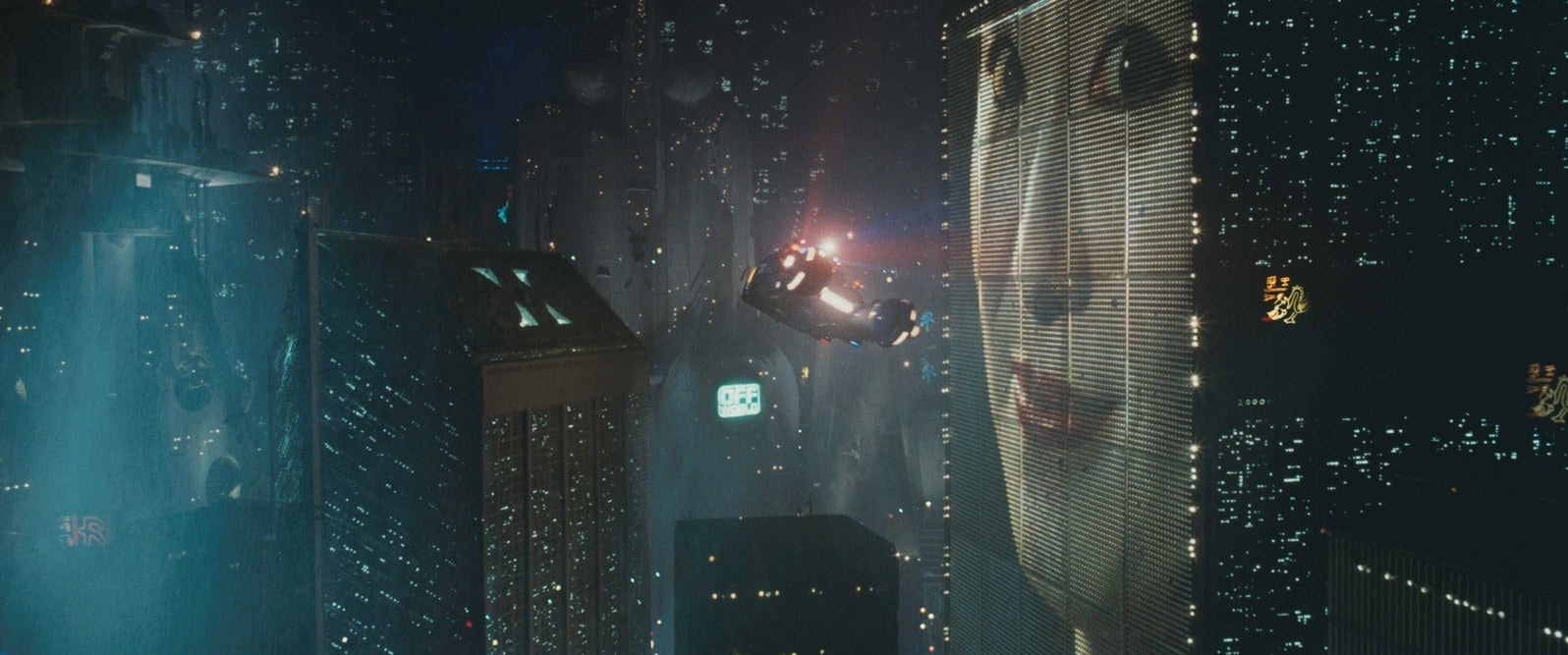
“It's artistically my biggest challenge so far in my life,” said Villeneuve. "Movies are so conservative right now. [Studios] are making movies that are like made by robots. If Hollywood wants to survive, it will have to go back to the roots of filmmaking, which is creativity and risk.” He paused, and sighed. He had just finished a day of shooting in Hungary, and although he demurred from discussing the film in any detail, the excitement — and exhaustion — in Villeneuve’s voice was palpable. “There's more and more of an appetite for strong sci-fi movies right now, and I’m very happy about it," he said. "I want to embrace that wave.”
And as that wave grows, Hollywood has started to embrace the less traditionally commercial realms of science fiction within its ecosystem of populist filmmaking. (Deep breath.) Writer-director Alex Garland (Ex Machina) has completed production of his adaptation of Jeff Vandermeer's sci-fi novel Annihilation, with Natalie Portman, Tessa Thompson, Jennifer Jason Leigh, and Gina Rodriguez, which Paramount is set to release in 2017. There's also the upcoming sci-fi thriller God Particle, produced by J.J. Abrams and directed by Julius Onah (The Girl Is in Trouble), which will reportedly be at once an original film that is also somehow connected to the tenuously linked sci-fi thrillers Cloverfield and 10 Cloverfield Lane. EuropaCorp will release two radically different sci-fi projects next year: The Circle, an adaptation of Dave Eggers' sci-fi novel from writer-director James Ponsoldt (The Spectacular Now) starring Emma Watson and Tom Hanks, and Valerian and the City of a Thousand Planets, a wildly ambitious adaptation of the eponymous French comic books that has been a lifelong dream of writer-director Luc Besson (The Fifth Element, Lucy). And Disney’s big-budget adaptation of Madeleine L'Engle's beloved and highly idiosyncratic novel A Wrinkle in Time, with director Ava DuVernay, features one of the most diverse casts ever assembled for a movie of this scope. Meanwhile, Netflix is bankrolling sui generis sci-fi productions Mute and Okja, from singular writer-directors Duncan Jones (Moon, Source Code), and Bong Joon-ho (Snowpiercer, The Host), respectively.
"The days of if you were a sequel and it didn't quite live up to expectations [but] you could kind of get away with it — that doesn't really exist anymore."
What Spaihts and Heisserer spent years trying to accomplish with their sci-fi projects is now happening at, yup, light speed: For Life, Ellison said that it took four days between when Sony Pictures chief Tom Rothman read the script to when the studio had signed on to make the film. "The fact that it is original, and it's not based on anything, and it truly shows the audience something they've never seen before — there was a huge appetite for that," said the producer. "I hope that that is something that continues, because I think it's only good for the movie business. The days of if you were a sequel and it didn't quite live up to expectations [but] you could kind of get away with it — that doesn't really exist anymore. Audiences now have more options than they've ever had. If we just recycle material over and over and over again, especially with how much television is innovating, I think the movie business will find itself in a very precarious situation."
Studios still spend the vast majority of their resources constructing cinematic universes by market-tested committee. And their interest in investing in singular, expensive, original sci-fi productions could be one major flop away from fizzling into the netherworld where lavish musicals and YA dystopias spend eternity waiting for people to care again. But without out-of-the-box movies like Ex Machina or Inception or District 9, feature filmmaking could just as easily find itself wandering a wilderness of empty, hackneyed spectacle, forever in the shadow of the pioneering creative visions of shows like Westworld and Stranger Things.
“When you go to the movies, you expect the movie to create a world that you can immerse yourself in, that you can step into. Sci-fi is a beautiful way of doing that,” said Tyldum. “I think that's how movies will survive.” ●
